As your little one grows from baby to toddler, you’ll see a lot of changes. This time, from 12 to 36 months, is full of new skills. Your child will learn physical, thinking, and social skills. Knowing these important milestones helps you support your child’s growth.
In this guide, we’ll look at the different areas of toddler development. We’ll talk about the skills your child will learn during this key time. This info is great for any parent, whether it’s your first time or not. It helps you understand and celebrate your child’s growth.
Key Takeaways
- Toddlers experience rapid physical, cognitive, and social-emotional development from 12 to 36 months.
- Understanding toddler milestones can help parents support their child’s growth and identify any potential developmental delays.
- Toddlers typically acquire a range of skills, including motor coordination, language, communication, problem-solving, and social interaction.
- Monitoring your child’s progress against developmental markers can provide valuable insights into their unique growth patterns.
- Engaging in age-appropriate activities and providing a nurturing environment can promote your toddler’s healthy development.
Understanding Early Childhood Development Stages
Early childhood is a key time for a child’s growth. It’s when they learn and develop fast. They reach important developmental milestones that shape their future.
Physical vs. Cognitive Development
Children grow in different ways. Their physical skills, like moving and balancing, grow quickly. But their thinking and learning skills take more time. It’s important for parents to know this to help their child grow well.
Why Milestones Matter
- Milestones help us see how a child is doing and if they need help.
- By watching milestones, we can help children reach their full potential early.
- Seeing and celebrating a child’s achievements boosts their self-confidence.
Individual Development Patterns
Every child grows differently. Some might hit milestones sooner or later than others. It’s okay. We should support and celebrate each child’s unique journey.
“Each child is a unique individual, with their own strengths, challenges, and developmental timeline. The key is to support and celebrate their progress, not to compare them to others.”
Motor Skills Development in Toddlers
Toddlers grow and show amazing progress in their gross motor skills and fine motor skills. These skills are key signs of a child’s physical development and health.
Gross motor skills start with big muscles. Toddlers start walking around their first birthday. They then learn to run, jump, and climb. These skills help them move better, feel more confident, and become more independent.
- Walking: 12-18 months
- Running: 18-24 months
- Jumping: 24-36 months
- Climbing: 24-36 months
On the other hand, fine motor skills involve smaller muscles. Toddlers learn these skills by picking up objects, stacking blocks, and using forks and knives. These skills are important for more complex tasks like writing and drawing.
- Grasping objects: 12-18 months
- Stacking blocks: 18-24 months
- Using eating utensils: 24-36 months
Knowing when toddlers usually develop these skills helps parents and caregivers support their growth. It also gives them chances to explore and practice.
“The development of motor skills is a crucial aspect of a child’s overall growth and well-being. Observing and nurturing these milestones can have a profound impact on a toddler’s confidence, independence, and future academic and social success.”
Language and Communication Progress
Toddlers show amazing growth in their language skills and communication. They start with their first words and move to full sentences. This is a key time for their communication abilities.
First Words and Sentences
By 12 months, toddlers say their first words. These are often names of objects or family members. By 18 months, they know more words and start making short sentences.
Non-verbal Communication Skills
Toddlers also get good at non-verbal communication. They use gestures like pointing and waving to show what they want. These gestures help them connect with others before they can talk more.
Reading and Speech Development
As they grow, toddlers start to like books and stories. They might recognize pictures and mimic sounds they hear. This is the start of their reading and speaking skills.
| Milestone | Average Age |
|---|---|
| First Words | 12 months |
| Two-Word Sentences | 18 months |
| Recognizing Objects in Books | 18-24 months |
| Mimicking Language Sounds | 24 months |
Knowing how toddlers develop language helps parents support them. A caring environment and fun activities help them reach important milestones. This sets them up for a lifetime of good communication.
Social and Emotional Development Markers
Toddlers grow and explore, reaching key milestones in social and emotional intelligence. These markers shape their self-awareness and help them connect with others.
One key marker is self-awareness. Toddlers start to see themselves as unique, showing independence and wanting to choose. This self-awareness is the base for emotional intelligence, helping them understand and manage their feelings.
Toddlers also show growth in social skills. They play alongside others, then start to play together, sharing and taking turns. This helps them build strong friendships and handle social situations.
They also show early signs of empathy and cooperation. They might comfort a sad friend or share toys, showing they care about others. These milestones are vital for self-awareness and healthy relationships later on.
| Social and Emotional Milestones | Key Developmental Achievements |
|---|---|
| Self-awareness | Recognizing themselves as individuals, expressing preferences, and developing emotional intelligence |
| Social skills | Engaging in parallel and cooperative play, sharing, taking turns, and navigating social interactions |
| Empathy and cooperation | Comforting others, sharing toys, and considering the perspectives of their peers |
“The foundations of social and emotional development are laid during the toddler years, setting the stage for lifelong interpersonal skills and self-awareness.”
Toddler Milestones: Month by Month Guide
Watching your little one grow is amazing. They develop quickly in many areas. We’ll look at milestones for ages 12-18 months, 18-24 months, and 24-36 months.
12-18 Months Development
Between 12 and 18 months, toddlers start walking well. They understand simple words and say their first words. They point to things, imitate others, and solve simple problems.
18-24 Months Progress
At 18-24 months, toddlers can follow two-step instructions. They know familiar faces and objects. They also start playing make-believe and speak in short sentences.
24-36 Months Achievements
By 24-36 months, toddlers make big steps. They climb stairs, kick balls, and follow complex instructions. They sort shapes, play together, and show many emotions.
Every child grows differently. It’s key to celebrate their unique progress. If you’re worried about your child’s growth, talk to a pediatrician.
“Watching my child grow and reach new milestones has been one of the most rewarding experiences of my life.”
Cognitive Skills and Problem-Solving Abilities
As your toddler grows, you’ll see big changes in their thinking and problem-solving. These skills are key for their future in school and beyond.
One early skill is memory. Toddlers start to remember things well, surprising parents with their recall. This helps them solve problems by using what they’ve learned before.
Attention span also grows during these years. Kids can now focus longer, which helps them play and learn better. This focus is important for solving complex problems and understanding math.
- Toddlers show big growth in memory, attention, and problem-solving.
- Memory helps them solve problems by using past experiences.
- Better focus helps with logical thinking and math.
Watching your toddler grow is amazing. You’ll see their cognitive development, problem-solving skills, and critical thinking get better. These are important steps towards a lifelong love of learning.
Warning Signs of Developmental Delays
As parents, it’s important to know the signs of developmental delays in toddlers. Spotting these signs early lets us get help from healthcare experts. This support helps our children reach their full potential.
When to Consult a Pediatrician
If you see any of these signs in your toddler, see a pediatrician. They can do a full check-up:
- Delayed speech or language development
- Difficulty with fine or gross motor skills, such as grasping objects or walking
- Lack of social interaction or eye contact
- Repetitive behaviors or resistance to change in routine
- Persistent difficulty with problem-solving or cognitive skills
Common Developmental Concerns
Pediatricians often look for these common issues in toddlers:
- Autism Spectrum Disorder (ASD): Challenges with social communication, restricted interests, and repetitive behaviors.
- Attention Deficit Hyperactivity Disorder (ADHD): Inattention, hyperactivity, and impulsivity that affect learning and behavior.
- Speech and Language Delays: Trouble with understanding or speaking, making communication hard.
- Sensory Processing Disorders: Trouble processing sensory information, leading to behavioral and developmental challenges.
Early Intervention Benefits
Early intervention is key for addressing developmental delays. Working with specialists and therapists, parents get access to services like speech and occupational therapy. These early efforts can greatly improve a child’s development and well-being.
| Benefit | Description |
|---|---|
| Improved Outcomes | Early intervention can help toddlers with developmental delays catch up to their peers, reducing the long-term impact of these challenges. |
| Enhanced Skills | Targeted therapies and support can help toddlers develop essential skills in areas such as language, motor function, and social-emotional well-being. |
| Reduced Stress | Early intervention provides parents with the tools and resources to support their child’s development, helping to alleviate stress and promote family well-being. |
Supporting Your Toddler’s Development
As a parent, you are key in helping your toddler grow. A supportive and stimulating environment is crucial. It helps with physical, cognitive, and social-emotional growth. Here are some tips to support your toddler’s development.
Provide a Nurturing Environment
- Offer a warm, loving, and responsive caregiver-child relationship, which is essential for building trust and security.
- Establish consistent routines and schedules to help your toddler feel safe and secure.
- Encourage exploration and curiosity by setting up a child-friendly, stimulating space with age-appropriate toys and activities.
Promote Developmental Stimulation
- Engage your toddler in activities that challenge their skills, such as puzzles, shape sorters, and imaginative play.
- Read aloud to your child regularly, exposing them to new vocabulary and language concepts.
- Encourage physical activity and movement, which support gross and fine motor development.
Foster Parental Support
| Parental Support Strategies | Benefits for Toddler Development |
|---|---|
| Praise and positive reinforcement | Boosts self-esteem and motivation |
| Patience and understanding | Helps build trust and emotional security |
| Responsive and attentive caregiving | Promotes healthy attachment and social-emotional skills |
By creating a nurturing environment, providing developmental stimulation, and offering parental support, you can help your toddler thrive. Embrace the journey of supporting your child’s growth and watch them blossom.
“The most important thing that parents can do is to have a loving, warm, stable relationship with their children.”- Professor Mary Main, University of California, Berkeley
Activities to Promote Developmental Growth
Helping your toddler grow can be fun and rewarding. You can use games, play-based learning, and educational toys to support their development. These activities help in physical, cognitive, language, and social skills.
Age-Appropriate Games
Games like hide-and-seek, Simon Says, and peek-a-boo are great for toddlers. They improve problem-solving, motor skills, and social awareness. These games help your child learn by exploring, imitating, and following directions.
Learning Through Play
Play is key for toddlers’ growth. Activities like building with blocks, painting, and pretend play boost creativity and fine motor skills. Playing with your child helps their brain and language skills grow.
Educational Toys and Tools
Using educational toys and tools is important. Puzzles, shape sorters, and books are great for learning. They entertain and help with problem-solving, hand-eye coordination, and reading skills.
FAQ
What are the key physical, cognitive, and social skills that toddlers typically acquire during the 12-36 month age range?
Toddlers in this age range learn many skills. They start walking, running, and climbing. They also learn to use their hands and say their first words.
They understand non-verbal cues and become aware of themselves. They make friends and show their feelings.
Why are toddler development milestones important to track?
Tracking milestones is key to seeing how a child grows. It helps spot any delays early. Every child grows at their own pace.
Knowing what’s normal helps parents support their child’s development. This ensures they get the right help when needed.
How do physical and cognitive development compare in toddlers?
Toddlers grow physically and cognitively at different speeds. Physical skills like walking come first. But, their thinking and problem-solving abilities also grow a lot.
What are some common warning signs of developmental delays in toddlers?
Signs of delays include slow speech and trouble with fine motor skills. Toddlers might also struggle with social skills or show little emotion. If worried, talk to a pediatrician.
How can parents and caregivers support their toddler’s overall development?
Create a loving, stimulating space for your toddler. Play and read together. Encourage them to explore and learn.
Set routines and boundaries. Positive feedback helps them grow. These steps support their development.
What types of activities and educational toys can promote developmental growth in toddlers?
Toddlers benefit from many activities. Building blocks, puzzles, and pretend play are great. Music, dance, and outdoor play also help.
Choose toys that challenge their minds and hands. Shape sorters, peg boards, and books are good choices. They support their growth.

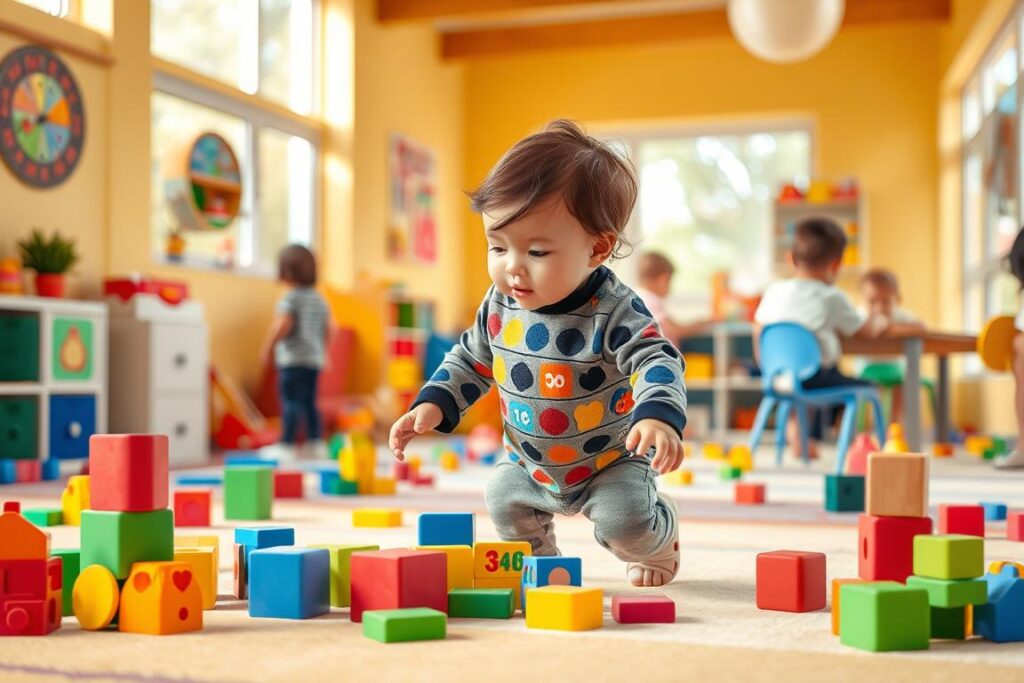
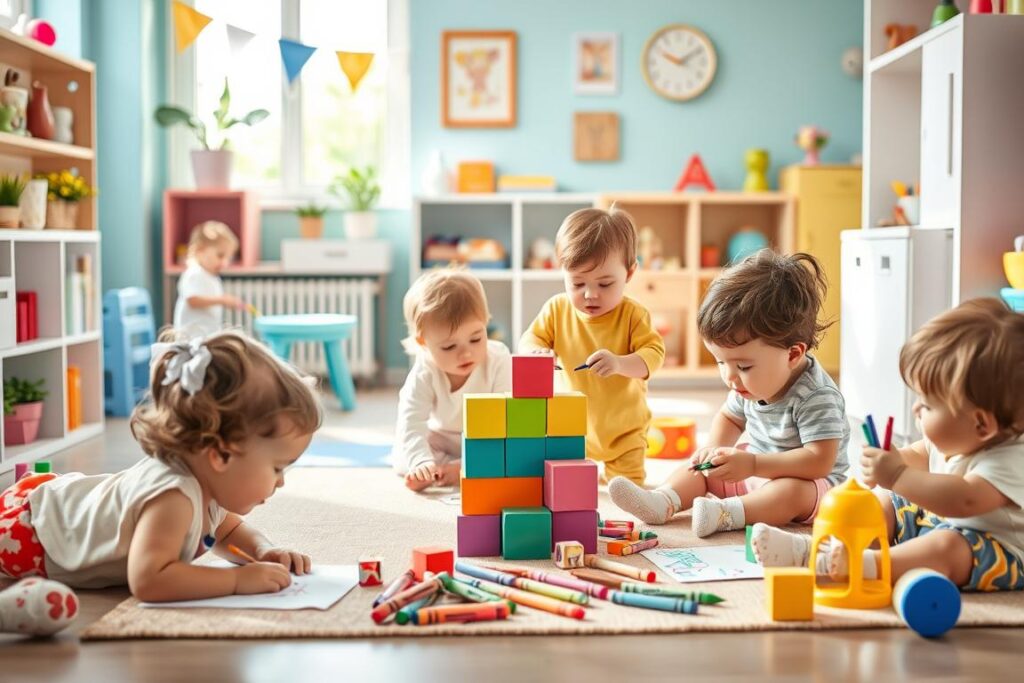
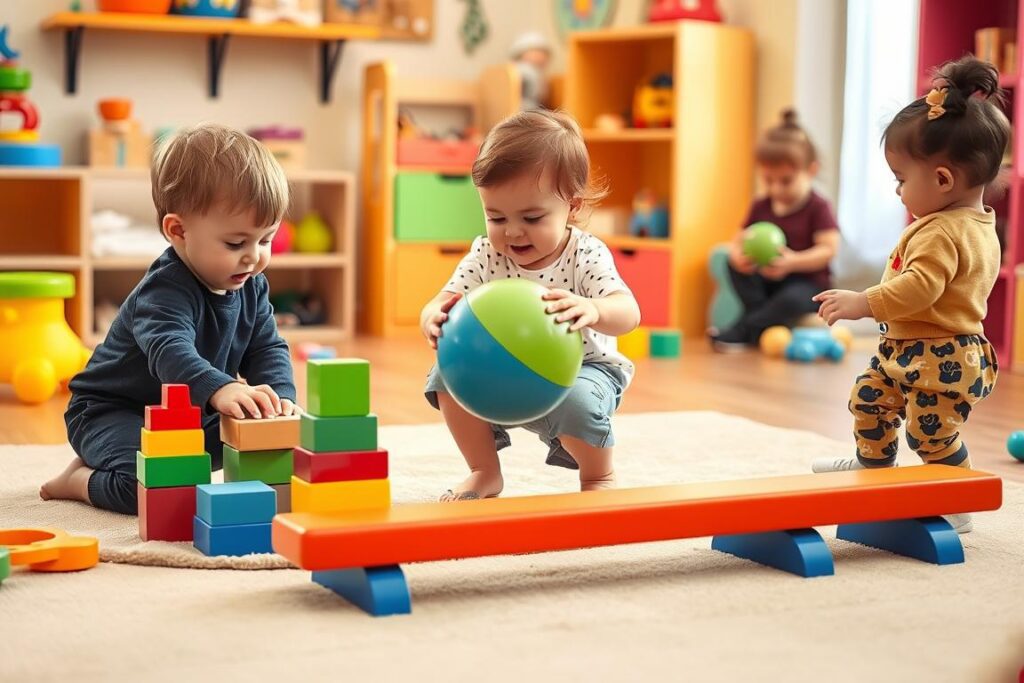
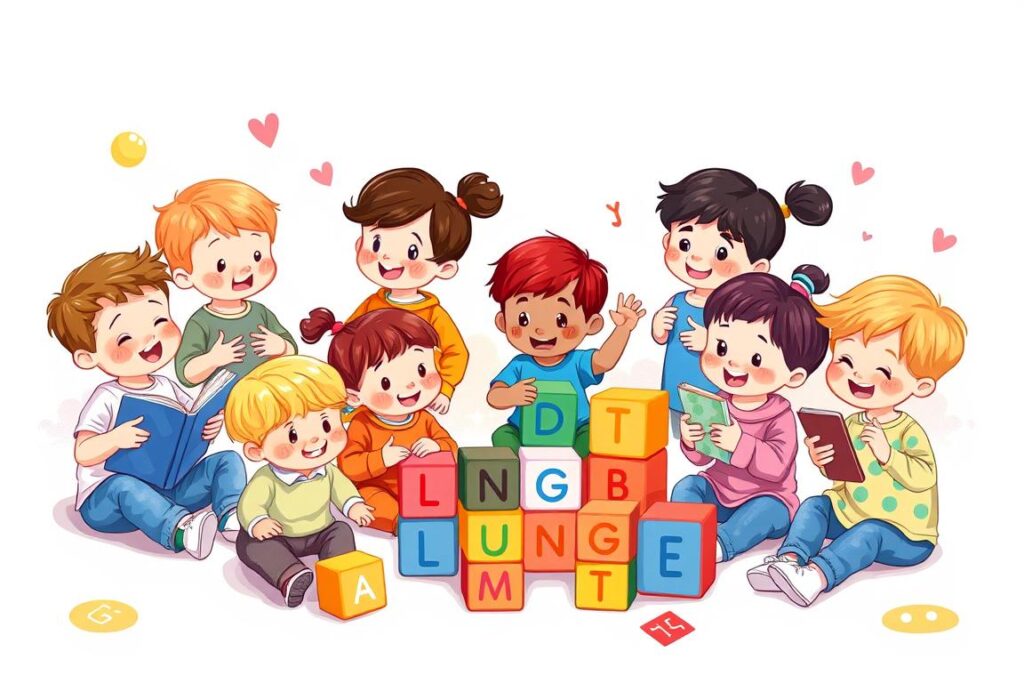
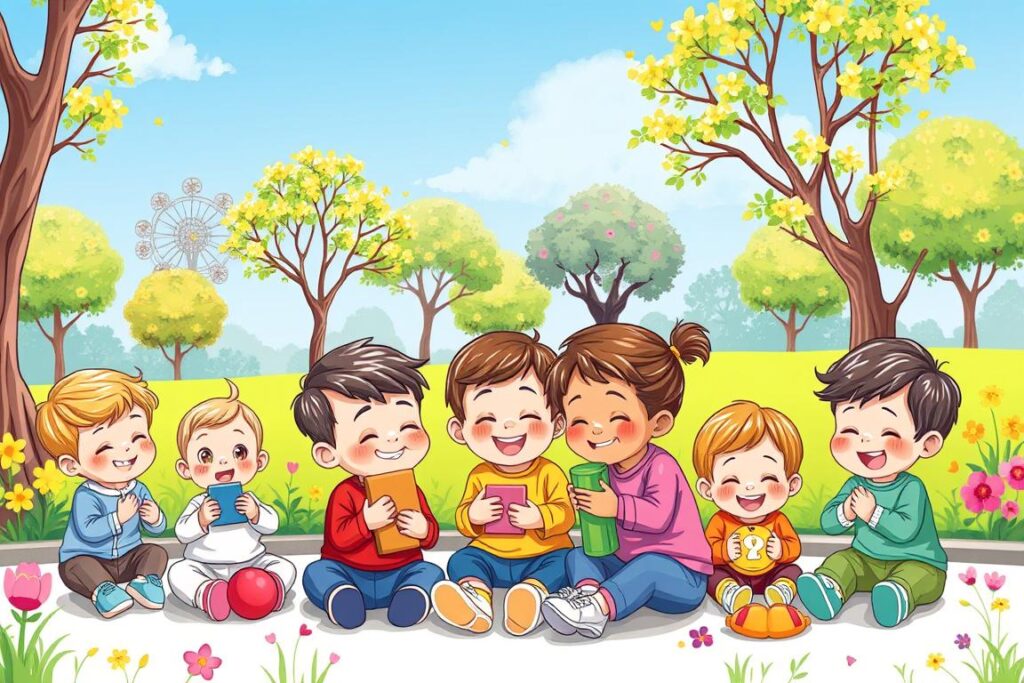






1 thought on “Toddler Milestones: Skills Your Child Will Learn and When”